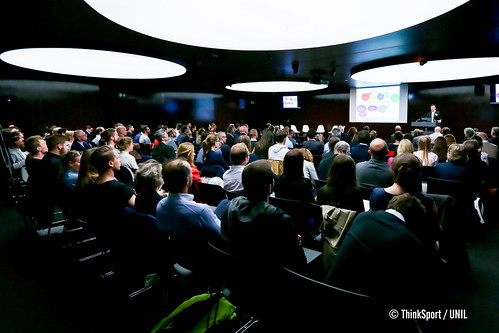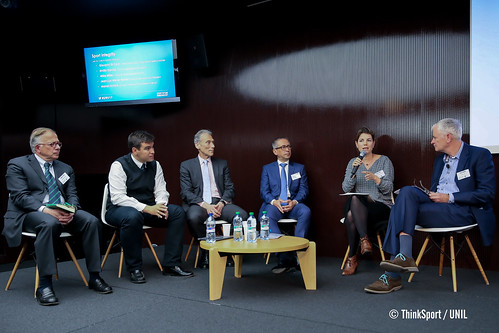
Latest news & views
Lively debates on digital revolution and integrity make for memorable Sport Future Rendez-Vous
PRESS RELEASE
A line-up of excellent speakers on the pressing topics of the digital revolution and integrity in sport, paired with an engaging audience provided for a number of exciting discussions at this year’s edition of Sport Future Rendez-Vous, held from 9 to 10 May 2017 in Lausanne.
Organised jointly by ThinkSport and the University of Lausanne (UNIL), the sold-out event attracted more than 200 people from the academic world, sport organisations, United Nations institutions, NGOs, media and the business sector.
Click here to learn more about the programme and the speakers.
On day one, keynote speaker Claude Ruibal, Infront Sports & Media Executive Director of Digital Production, encouraged the audience to accept the digital revolution as a reality, embrace it, and make use of the many opportunities it entails. These opportunities include leveraging the wide variety of platforms and tailoring content suitable for each to engage directly with fans, creating better on-site experiences, and developing new revenue streams. Ruibal stressed that digital strategies can only be successful if there is an alignment across the entire organisation, including management, communications, marketing and sales, in addition to IT and digital.
While digital is becoming an increasingly important business tool for most sports federations, there was broad agreement on the urgent need for sports governing bodies to adapt quicker to our changing world, making use of innovative technologies and exploring new ways to engage with fans. In addition, there was an interesting discussion on how the emerging “e-sports” fit into the current landscape and can actually serve to build skills, for instance those related to navigation required during the practise of certain sports.
Patrick Magyar, Managing Partner of Interface Marketing, shared his views about the past and future of sport and stressed the importance of using digital not only to monetise sport, but to promote sports participation at the grassroots level. He also warned of the risk of elite sport turning into a pure entertainment spectacle if important values such as fair play, integrity and respect are not restored immediately.
Day two was dedicated to the topic of integrity in sport and the challenges and untapped opportunities associated with it. Bengt Kayser, medical doctor and professor at the Institute of Sports Science of UNIL, explained during his keynote speech that because the term “integrity” is used in various ways it often leads to misunderstanding. The term can apply to both individuals and organisations and refers to being true to the maintenance of an identity, or sticking to core values. The issue with such a definition, according to Prof. Kayser, is that a person or an organisation can “stay true to themselves” while not necessarily acting in a moral manner. Therefore it is perfectly possible to imagine a sport organisation that as a body is upright and acts in a coherent manner, but is involved in activities with consequences that are immoral.
There was broad consensus among the panellists and audience members that sport is currently facing some serious threats both on the field of play and off, in particular with regard to good governance. It was also agreed that sport needed to act urgently to regain trust, confidence and credibility. The panel discussion included representatives from various sectors and offered interesting insights into the different approaches being taken to tackle integrity issues. Giovanni Di Cola, Special Advisor to the International Labour Organisation (ILO), and Manon Schick, Director of Amnesty International Switzerland, both called on sport organisations to broaden their views and become far more responsible with respect to human rights, workers’ rights and environmental protection during the preparation of major sport events.
For the first time at the event, young academics enriched the programme both days with short presentations about their dissertations in sport-related fields.
Anna Hellman, Director of ThinkSport, said at the close of the event: “We experienced two days of very interesting exchanges among a great diversity of speakers. ThinkSport facilitates the dialogue and collaboration between different sectors linked to sport and Sport Future is a good example of how this takes shape. In 2017, we have been getting more involved in supporting events, with the sport-specific job fair “iWorkinSport” and a hospitality course for sport federations being further examples.”
Jean-Loup Chappelet, Professor at IDHEAP Swiss Graduate School of Public Administration at UNIL, who introduced the topic of sport integrity, said: “Since its launch last year, ThinkSport has become a valuable partner for us, helping us to build bridges with other sport stakeholders. Their collaboration for this event was essential because it enabled us reach a wider audience than we usually have in universities. We often tend to stay to ourselves, academics and scholars speaking only to each other. Here we have been able to integrate several types of audiences, presenting a wealth of views during stimulating debates.”
You can re-live all sessions here.
Continue to follow us on thinksport.org and on Twitter @ThinkSportCH.
Check out still images from the event here.
Photo Album
DAY 1 (Download pictures here)
DAY 2 (Download pictures here)
